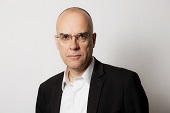ASCL Webinar: Africa and the Global Middle Ages
Primary tabs

Detail from the 'Atlas Catalan'. Photo: Bibliothéque National de France.
Registration has been closed. Contact Rik Jongenelen if you unexpectedly cannot attend, so we can pass on your digital seat to someone else.
This seminar will take place as an online webinar. Registrees will receive a link shortly before the webinar.
From the birth of Islam in the seventh century to the voyages of European exploration in the fifteenth, many regions in Africa found themselves crisscrossed by merchants, clerics and pilgrims, travelers and diplomats. Indeed, the very existence of these routes — as well as the ideas, representations, practices and goods they conveyed — evidences the interconnectedness of these regions with the rest of the medieval oecumene. Or, to put it differently: we must count these regions of Africa among the interconnected provinces of a global medieval world. Drawing on written as well as archaeological sources, this talk will take detailed examples from Christian and Islamic medieval Ethiopia, and discuss comparisons with Ghana and Mali in West Africa, and Kilwa and Mapungubwe in East and South Africa. It will also discuss hypotheses about why so many once-famous capital cities of African polities still remain elusive in the field.
 A historian and archaeologist of ancient Africa, François-Xavier Fauvelle is a Professor at the Collège de France in Paris, on the first chair ever devoted to African history in this institution. A former director of the French Center for Ethiopian Studies in Addis Ababa, Ethiopia, and of TRACES in Toulouse, one of the leading international laboratories in archaeology, he was the coordinator of several historical and archaeological research programs in Africa, mostly in Ethiopia and in Morocco. He is the author or editor of around 20 books and the author or coauthor of around 150 academic articles. His book The Golden Rhinoceros: Histories of the African Middle Ages, originally published in French in 2013, received the main French award for academic history books.
A historian and archaeologist of ancient Africa, François-Xavier Fauvelle is a Professor at the Collège de France in Paris, on the first chair ever devoted to African history in this institution. A former director of the French Center for Ethiopian Studies in Addis Ababa, Ethiopia, and of TRACES in Toulouse, one of the leading international laboratories in archaeology, he was the coordinator of several historical and archaeological research programs in Africa, mostly in Ethiopia and in Morocco. He is the author or editor of around 20 books and the author or coauthor of around 150 academic articles. His book The Golden Rhinoceros: Histories of the African Middle Ages, originally published in French in 2013, received the main French award for academic history books.

